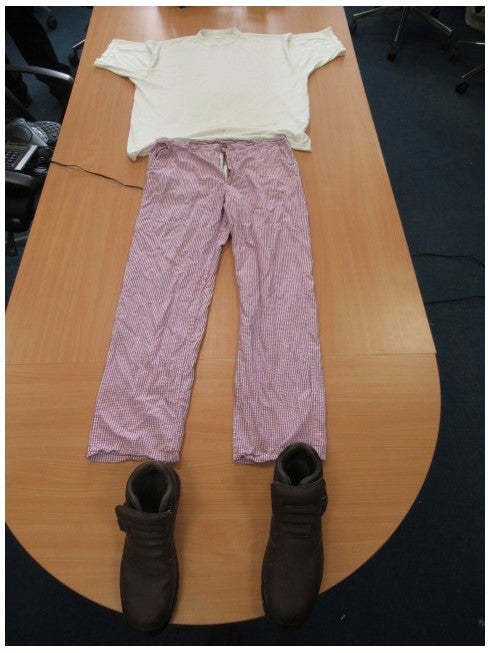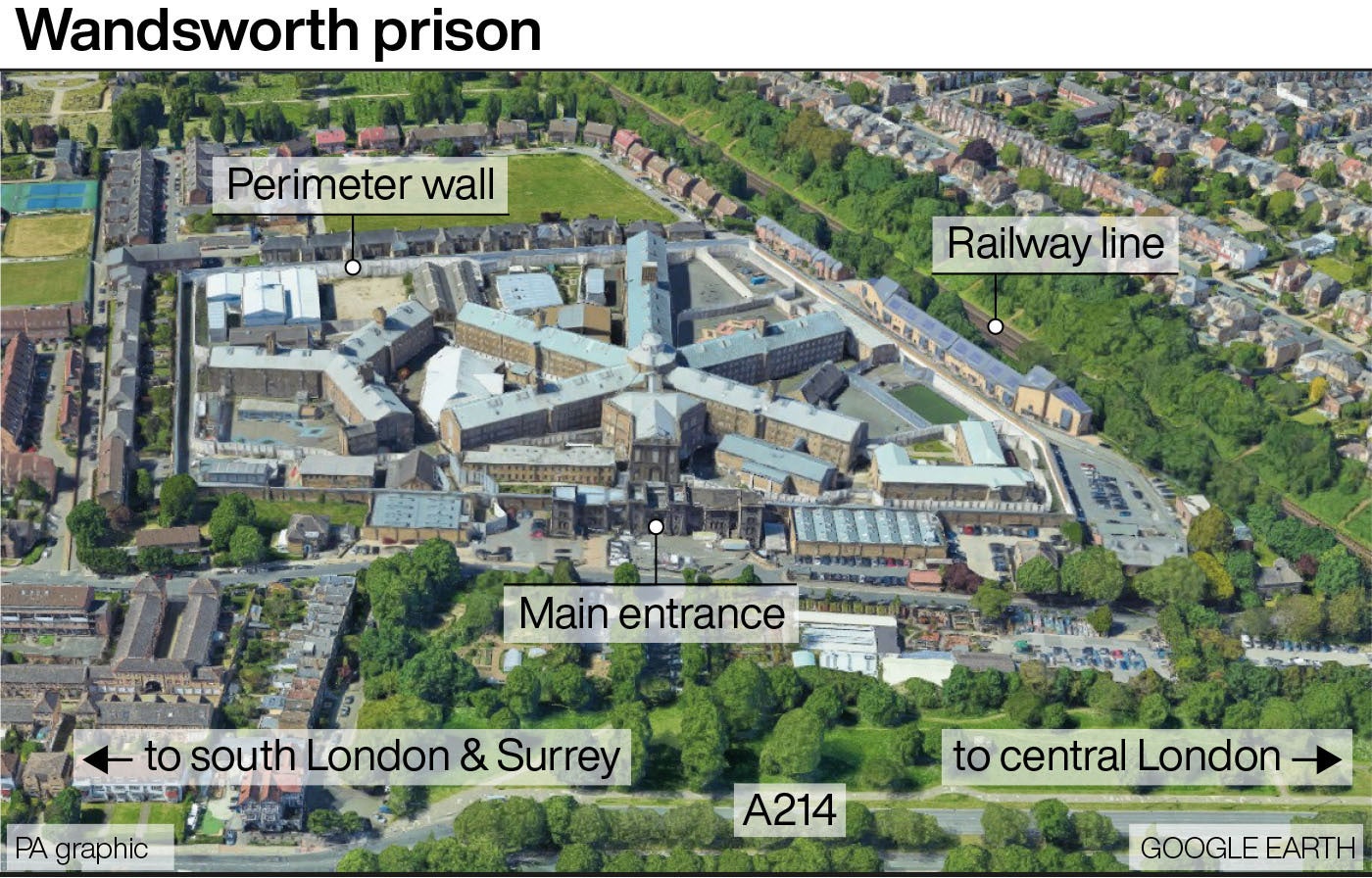Daniel Khalife escape: Anarchy revealed inside prison-break Wandsworth jail where inmates call the shots
Ex-soldier suspected of spying for Iran belonged to British regiment dealing with ‘highly sensitive’ communications for key Nato reaction force, The Independent understands
The chief inspector of prisons has revealed the chaos inside overcrowded Wandsworth jail where inmates tell staff the rules – as questions mount about the “inside help” fugitive Daniel Khalife was given to make his dramatic escape.
Writing exclusively for The Independent, Charlie Taylor described “small, dark and cramped” cells plagued with damp and vermin, where inmates are routinely locked up for 22 hours a day with little access to education or training to break the cycle of offending.
Mr Taylor said the single biggest problem that faces Wandsworth is a lack of staff, with shortages in every area. He added that many staff were only recently out of school and so inexperienced that prisoners frequently have to tell new workers what they are supposed to do.
As the national manhunt edged into its fourth day, police detailed the first confirmed sighting of the 21-year-old British army soldier – who slipped past guards at the category B prison by clinging to straps placed underneath a food delivery truck – describing it as a significant lead.

The terror suspect was spotted near Wandsworth roundabout, close to the prison, having jumped from the Bidford food truck on which he fled on Wednesday morning.
The revelation comes as:
- It emerged that the Royal Signals Corps soldier previously served in a regiment providing support to Nato’s “premier reaction force” as spying concerns grow
- Police release the first images of the chef’s outfit he would have been wearing when he escaped
- A £20,000 reward has been offered to anyone with information that could lead to his capture
- Met Police commissioner Sir Mark Rowley said the security breach was “clearly pre-planned” as police investigate a possible “inside job”
- Helicopters scoured Richmond Park and South Kensington chasing up potential leads
Outlining the issues at the ageing prison, Mr Taylor said the “biggest problem” facing the Victorian-era jail was the lack of available staff.

An inspection last year found that 30 per cent of prison officers were unable to perform their duties, with the incessant influx of drugs causing high levels of violence. “For many years, it has been a jail that struggles in every area,” Mr Taylor said.
Speaking of the environment at HMP Wandsworth, whose performance was rated a “serious concern” last year, Mr Taylor said: “Without enough bodies on the ground to deliver a basic prison regime to these men, there are serious consequences.
“Prisoners will not be unlocked on time because there is nobody to do it. They will not get to education or employment because there is nobody to escort them. They will not have clean clothes or bedding. The demand, and thus the supply, of drugs will rise, and with it an illicit economy that leads to debt and to violence.”

His comments come as the police operation to find the terror suspect has swelled to over 100 officers as dozens of members of the public have come forward with potential leads.
Security officials told The Independent on Thursday that Khalife, a military computer engineer, may have been attempting to “graduate” to spying for Iran with material he is accused of gathering from the Ministry of Defence’s Joint Personnel Administration System.
He is understood to have served as a military computer engineer with the 22 Signal Regiment, whose role is to offer communications support to Nato’s Allied Rapid Reaction Corps (ARRC), described by one expert as the military alliance’s “premier reaction force”.
Former Nato analyst Dr Patrick Bury told The Independent that ARRC was “a juicy intelligence target” for the Western military alliance’s adversaries.
Speaking of the 22 Signal Regiment’s role at ARRC, he said: “It’s obviously sensitive stuff and you’re dealing with secure communications which is all manner of electronic and radio communications, and satellite and beyond, for Nato’s basically premier reaction force.
“So if you’ve got someone on the inside who can provide some information about that, the question is – what access did he have? We’ve seen from [Edward] Snowden how a computer network engineer often can get the whole gamut, legitimately or not.”
“It’s secure, it’s highly sensitive – it’s a juicy intelligence target. Why would the Iranians want to do it? To trade, of course, with the Russians, and perhaps to trade with China,” added Dr Bury, now a defence and security expert at the University of Bath.

Metropolitan Police chief Sir Mark Rowley on Friday appeared to confirm information from intelligence sources, as revealed by The Independent on Thursday, that officers were investigating the possibility that Khalife had help escaping HMP Wandsworth.
“The fact he could strap himself onto the bottom of the wagon, there’s obviously some logistics involved,” Sir Mark told LBC.
“Just to work out a prison escape – how you can do the logistics of it and get the right equipment, and how you’re going do it – is unlikely to be something you do on the spur of the moment.”
He added: “We’re going to have to look at everything as part of this investigation: did he do this on his own? Did anyone inside the prison help him? Did anyone outside the prison help him?”
Sir Mark warned it was “extremely concerning” that the former Royal Signals Corps soldier was “on the loose”, and said that “well into three figures” of officers were now involved in the hunt, in addition to Border Force and forces elsewhere in the country.

Khalife had been awaiting trial on three charges, including gathering information likely to be useful to an enemy.
He is also accused of planting fake bombs at his barracks in Stafford, before fleeing the military site and evading capture for a further 25 days.
The Met’s counter-terrorism commander, Dominic Murphy, told reporters on Thursday it was “a little unusual” that there had been no sightings of Khalife which is “perhaps testament to Daniel Khalife’s ingenuity”.
“He was a trained soldier – so ultimately he has skills that perhaps some sections of the public don’t have. He’s a very resourceful individual, clearly, and our experience of him shows that, so nothing is off the table with him at the moment.”







